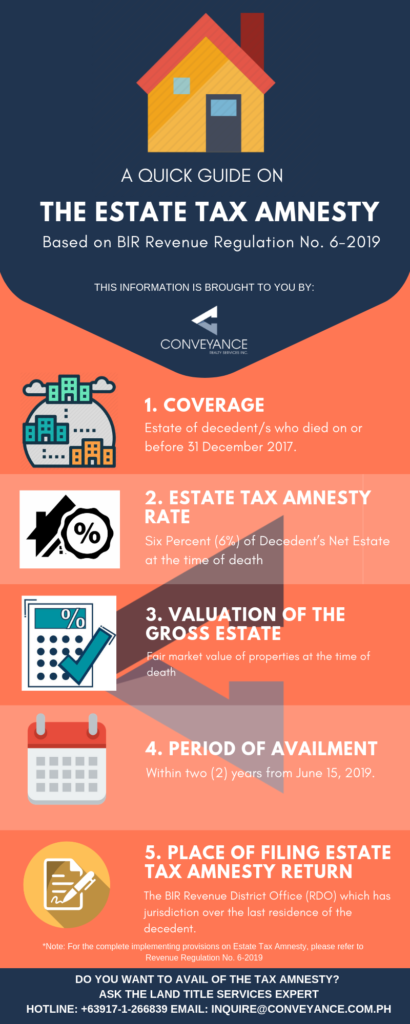Did you inherit a Real Estate Property?
Under the Philippine law of intestate succession, (the decedent left no will), the compulsory heirs (spouse and children) will automatically inherit the estate of the decedent at the time of death. The estate includes both real estate and personal properties owned by the decedent.
However, before the heirs can sell or develop the inherited properties, they need to transfer the title of the properties under their names.
How do you transfer title of inherited properties in the Philippines?
If there is no will, the heirs must execute an Extra-Judicial Settlement of estate (EJS), a notarized legal document signed by all the heirs listing the properties comprising the estate of the decedent and the agreed manner of distribution of the estate among the legal heirs.
After which, they must file an Estate Tax Return (ETR) and settle the corresponding estate tax with the BIR.
The BIR will issue, upon verification of the ETR, a Tax Clearance to authorize the Registry of Deeds to transfer the title of the properties to the heirs.
What is Estate Tax?
Estate Tax (Inheritance Tax) is the tax imposed on the transfer of estate of a deceased person to his/her legal heirs.
The estate tax is very important because the properties or estate of the deceased cannot be transferred to the heirs without the payment of estate tax. Even if there is already a willing buyer, the heirs cannot transfer the property in the name of the buyer or sell the property if the title not yet transferred under their names.
However, due to the high tax rates, the estate tax proves to be a burden to the heirs. The heirs cannot enjoy the benefits of their property inheritance. In most cases, since this is an unplanned expense on the part of the heirs, they fail to settle the estate taxes on time resulting to the accumulation of penalties and interests and locking up of properties and delay in their development.
Estate Tax Amnesty
Good news to individuals with property inheritance. The Bureau of Internal Revenue (BIR) will start accepting application for the Estate Tax Amnesty program on June 17, 2019 following the release and publication of the Implementing Rules & Regulations (IRR) for the estate tax amnesty under BIR Revenue Regulations No. 6-2019. You can now settle the estate taxes of your property inheritance and transfer the titles of your properties under your name at a much lower cost without penalties, surcharge and interest.
The Estate Tax Amnesty is a component of the Tax Amnesty Act or Republic Act No. 11213 which was signed into law last 14 February 2019. The Estate Tax Amnesty aims to resolve the common problem of most Filipinos who were not able to settle the estate taxes of their deceased predecessors and transfer the title of their inherited properties under their names.
Here are the salient provisions of the IRR of RA 11213 for the Estate Tax Amnesty:
Coverage
The estate tax amnesty shall cover the estate of decedent/s who died on or before 31 December 2017, whose estate tax/es have remained unpaid as of December 31, 2017 with or without assessments duly issued.
Rate of Estate Tax
A tax amnesty tax rate of six (6%) shall be imposed on each decedent’s total net taxable estate at the time of death without penalties, at every stage of transfer of property with regards to the rules of succession under the Civil Code on the transfer of properties, rights, obligations and interests of the decedent.
Net taxable estate is Gross Estate less Allowable Deductions (Item 4 below). If the allowable deductions exceed the value of the gross estate, the minimum estate amnesty tax of PHP5,000 shall be paid for the transfer of estate of each decedent.
Valuation of the Gross Estate
The properties that comprised the gross estate of the decedent shall be valued based on the fair market value at the time of death of the decedent. For real properties, the valuation shall be the higher value between the zonal value as determined by the BIR or the fair market value assessed by the provincial and city assessors at the time of death of the decedent.
Deductions from the Gross Estate
The deductions from the gross estate will be based on the allowable deductions under the estate tax law applicable at the time of death of the decedent.
Time and Place of Filing Estate Tax Amnesty Return (BIR Form 2118-EA)
The legal heirs and administrator or executor of the estate can apply for the estate tax amnesty, within two (2) years from the effectivity of the IRR on June 15, 2019 or until June 15, 2021. They must file the Estate Tax Amnesty Tax Return (BIR Form 2118-EA) and pay the estate tax in the BIR Revenue District Office (RDO) which has jurisdiction over the last residence of the decedent.
Immunities and Privileges
Those who availed of the estate tax amnesty and have fully complied with the conditions will be immune from payment of estate tax penalties and from all civil, criminal and administrative cases under the 1997 Tax Code as amended.
Exceptions
Delinquent estate tax liabilities which have become final and executory and those covered by Tax Amnesty on Delinquencies and properties involved in pending cases under the jurisdiction of the Presidential Commission of Good Government, the Anti-Graft and Corrupt Practices Act and Plunder Law, Anti-Money Laundering Act, National Internal Revenue Code and the Revised Penal Code.
Here is an illustrative example of the benefits of the estate tax amnesty.
Freddy Mercury, an 85 year-old musician, single, died of a heart attack on December 31, 2010. His three (3) siblings will be his heirs. His gross estate is as follows:
Family Home – P5 Million
Other Real Properties – P3 Million
Other Assets – P2 Million
Before his death, he incurred P1M worth of medical expenses and burial expenses of about P500K.
How much will be the Estate Tax if the heirs will settle it now?
| Gross Estate | 10,000,000.00 |
| Less: | |
| Deductions | |
| Funeral Expenses | 200,000.00 |
| Family Home | 1,000,000.00 |
| Standard Deductions | 1,000,000.00 |
| Medical Expenses | 500,000.00 |
| Total Deductions | 2,700,000.00 |
| Net Estate | 7,300,000.00 |
| Estate Tax Due | 810,000.00 |
| Surcharge (50%) | 405,000.00 |
| Interest (20% per annum) 8 years | 1,296,000.00 |
| Total Estate Tax Due | 2,511,000.00 |
Under the Tax Code the Total Estate Taxes to be paid by the heirs is about P2.5 Million including penalties and accumulated interest for the past 8 years.
If the heirs avail the of Estate Tax Amnesty, how much will be the Estate Tax?
| Net Estate | 7,300,000.00 |
| Estate Tax Due (6%) | 438,000.00 |
| Surcharge (50%) | waived |
| Interest (20% per annum) | waived |
| Total Estate Tax Due | 438,000.00 |
| Tax Savings | -2,073,000.00 |
Under the Estate Tax Amnesty, the heirs need to pay an amnesty tax of 6 percent of the net estate or only P438K which translates to a tax savings of about P2 Million.
This is welcome news for taxpayers, especially for the heirs. This will make it affordable for the heirs to settle the estate taxes and transfer the title of the properties under their names.
They will now be able to enjoy the benefits of their property inheritance and maximize the value of the inherited real estate assets.
If you need clarification above or assistance regarding the transfer of title of inherited properties, you may call CONVEYANCE REALTY SERVICES INC. at 0917-1-266839 (CONVEY) or inquire through their website at www.conveyance.com.ph (mention WhenInManila.com for a special discount or gift while supplies last!)








